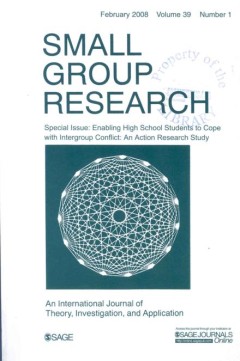Filter by

A supply-demand model of party-system institutionalization: The Russian case
An accountable democracy requires institutionalized parties. A supply—demand model hypothesizes that institutionalization is a function of four sets of influences: stability in election law, persisting commitments to parties by political elites and by voters, and learning by elites and by voters. The hypotheses are tested with aggregate data from nine nationwide elections in Russia since 1993, …
- Edition
- Vol. 16 no. 6, November 2010.pp. 801-821
- ISBN/ISSN
- 13540688
- Collation
- -
- Series Title
- Party Politics
- Call Number
- -

Party policy position of Die Linke: A continuation of the PDS?
In 2007, the German party Die Linke emerged as the result of the PDS (Party of Democratic Socialism; the successor of the Communist Party) merging with the WASG (Wahlalternative Arbeit und Soziale Gerechtigkeit; a break away left wing of the Social Democrats). This article compares the policy position of Die Linke with the positions of the two merging partners. Using a recently developed comput…
- Edition
- Vol. 16 no. 6, November 2010.pp. 721-735
- ISBN/ISSN
- 13540688
- Collation
- -
- Series Title
- Party Politics
- Call Number
- -

The multidimensional nature of party competition
Left—right is a convenient tool for summarizing the complexities of voter—party linkages in a manner that is comparable across contexts and that avoids the pathologies of preference aggregation in higher dimensions. Yet several reasons exist to believe that left—right is increasingly incapable of summarizing political behavior: the inability of left—right to capture policy concerns beyond econo…
- Edition
- Vol. 16 no. 6,November 2010. pp. 699-719
- ISBN/ISSN
- 13540688
- Collation
- -
- Series Title
- Party Politics
- Call Number
- -

Declining memberships, changing members? European political party members in …
In recent years, membership in established political parties has been shrinking, but at the same time members of some parties have received increased powers to help select candidates, leaders and party policies. These twin trends make it important to re-examine who is joining today’s smaller parties. As parties shrink, do they attract a changed mixture of members, possibly with different politi…
- Edition
- Vol. 16 no. 6, November 2010.pp. 823-843
- ISBN/ISSN
- 13540688
- Collation
- -
- Series Title
- Party Politics
- Call Number
- -

Understanding party constitutions as responses to specific challenges
Comparative studies of party organization often use party rules and constitutions as a source of data indicating the ideological position of parties, how they are structured and how they function. Although the use of party constitutions in empirical investigations is commonplace, there is almost no systematic analysis of constitutions as discrete documents. There is little enquiry as to why par…
- Edition
- Vol. 16 no. 6. November 2010.pp. 755-775
- ISBN/ISSN
- 13540688
- Collation
- -
- Series Title
- Party Politics
- Call Number
- -

How intra-party power relations affect the coalition behaviour of political p…
This article examines the impact of intra-party politics on the coalition behaviour of political parties. The policy-seeking model of party behaviour is refined by differentiating between policy purity and policy influence, arguing that the distribution of power within political parties affects how inclined they are to abandon policy ideals to participate in coalitions and thereby gain influenc…
- Edition
- Vol. 16 no. 6, November 2010.pp. 737-754
- ISBN/ISSN
- 13540688
- Collation
- -
- Series Title
- Party Politics
- Call Number
- -

Public images of leaders of anti-immigration parties: Perceptions of legitima…
In the last two decades several anti-immigration parties have risen in Western Europe. Some of these parties have been very successful in elections, whereas others have been rather unsuccessful. Some scholars have argued that this success depends in part on the extent to which voters perceive these parties (and their leaders) as legitimate (not violent or undemocratic) and as effective. However…
- Edition
- Vol. 16 no. 6, November 2010,pp. 777-799
- ISBN/ISSN
- 13540688
- Collation
- -
- Series Title
- Party Politics
- Call Number
- -

Psychological and communication processes associated with intergroup conflict…
This article examines the nature of intergroup conflicts and some of the psychological and communication processes that can facilitate their resolution. It focuses specifically on conflicts between individual members of different social identity groups and elaborates on the differences between interpersonal and intergroup conflict resolution. It continues with a presentation of the prevailing …
- Edition
- Vol. 39, No. 1, February 2008. Page 28-41
- ISBN/ISSN
- 10464964
- Collation
- -
- Series Title
- Small Group Research
- Call Number
- -

Group Processes to Reduce Intergroup Conflict: An Additional Example of a Wor…
This article's main emphasis is on describing and illustrating several group processes and theories that were used in an intervention to reduce conflict between Arab and Jewish youth in Israel as an additional example to the main one presented in this volume. These theories used in the Israeli example contribute substantially to the latter. Following a description of the Israeli workshop settin…
- Edition
- Vol. 39, No. 1, February 2008. Page 42-59
- ISBN/ISSN
- 1046-4964
- Collation
- -
- Series Title
- Small Group Research
- Call Number
- -

Project Program Development and Implementation
This article presents the project's processes and activities by describing the steps that were taken in its development and implementation. The first step was the planning and conceptualization of the program. The second step was carrying out the planned program. This has been repeated four times. Thus, the third step was examining each trial, modifying the program based on this examination, an…
- Edition
- Vol. 39, No. 1, February 2008. Page 60-81
- ISBN/ISSN
- 1046-4964
- Collation
- -
- Series Title
- Small Group Research
- Call Number
- -

An Introduction to the Project: Rationale and Development
This introductory article begins with a presentation of the focus of this special issue: a participatory action research project titled "Enabling Adolescents in Culturally Diverse Environments to Peacefully Resolve Ethnic Group Conflicts." The rationale for the project as well as its conceptual and theoretical foundations are indicated. After this, the authors note the steps taken to develop th…
- Edition
- Vol. 39, No. 1, February 2008. Page 3-16
- ISBN/ISSN
- 1046-4964
- Collation
- -
- Series Title
- Small Group Research
- Call Number
- -

Summary and Implications for the Next Stage: An Epilogue
This epilogue summarizes the articles presented earlier in this issue and indicates directions the project is likely to take in the future
- Edition
- Vol. 39, No. 1, February 2008. Page 104-110
- ISBN/ISSN
- 1046-4964
- Collation
- -
- Series Title
- Small Group Research
- Call Number
- -

Outcome Evaluation of the Intergroup Project
Using both quantitative data based on pre-post test questionnaires and qualitative data based on personal interviews with program participants, the authors examine the outcomes of students' experiences in a school-based intervention for improving intergroup relations between adolescents at two high schools. Specifically, the authors investigate whether students increase their awareness of socia…
- Edition
- Vol. 39, No. 1, February 2008. Page 82-103
- ISBN/ISSN
- 10464964
- Collation
- -
- Series Title
- Small Group Research
- Call Number
- -

Action Research: A Paradigm for Achieving Social Change
Action research was originally introduced by the late Kurt Lewin, who coined the term and who frequently used it in the realm of intergroup relations. Eight principles of action research based on Lewin's writings, and adopted by leading theorists and practitioners, are elaborated on in this article accompanied by illustrations of how they have been used in the study reported in this special issue.
- Edition
- Vol. 39, No. 1, February 2008. Page 17-27
- ISBN/ISSN
- 10464964
- Collation
- -
- Series Title
- Small Group Research
- Call Number
- -

Nonlinear Dynamics of Individual and Interpersonal Conflict in an Experimenta…
The current study examines the spread of experimentally induced conflict and rigidity from an individual to a group through the perspective of self-organization theory. The dependent measure of rigidity was operationally defined as entropy in conversational turn-taking dynamics in the small group. Four female undergraduates participated in a series of four 30-min discussions. The frequency dist…
- Edition
- Vol. 39, No. 2, April 2008. Page 150 - 178
- ISBN/ISSN
- 10464964
- Collation
- -
- Series Title
- Small Group Research
- Call Number
- -

Combined Effects of Knowledge About Others' Opinions and Anticipation of Grou…
There is conclusive evidence that information search processes are typically biased in favor of the information seeker's own opinion (confirmation bias). Less is known about how knowledge about others' opinions affects this confirmatory information search. In the present study, the authors manipulated feedback about others' opinions and anticipation of group interaction. As predicted, the effec…
- Edition
- Vol. 39, No. 2, April 2008. Page 203 - 223
- ISBN/ISSN
- 1046-4964
- Collation
- -
- Series Title
- Small Group Research
- Call Number
- -

The Effects of Demographic Differences on Forming Intragroup Relationships
Group behavior research suggests that differences among group members cause individuals to interact in ways that may enhance or weaken group performance. Dissimilarities among members may cause the development of negative attitudes about work groups, leading to dysfunctional performance. Network theorists have found that demographic factors influence individuals' tendency to form network …
- Edition
- Vol. 39, No. 2, April 2008. Page 179 - 202
- ISBN/ISSN
- 1046-4964
- Collation
- -
- Series Title
- Small Group Research
- Call Number
- -

Increasing Trust, Psychological Safety, and Team Performance Through Dyadic L…
In this article, the author uses a case-based argument to explore the idea that team members have grounded rationality, which may be actively learned by team leaders through a process of leadership discovery. The analysis reveals evidence that leaders using dyadic discovery methods learn more and more effectively customize leadership behaviors to increase trust, psychological safety, and tea…
- Edition
- Vol. 39, No. 2, April 2008. Page 224 - 248
- ISBN/ISSN
- 1046-4964
- Collation
- -
- Series Title
- Small Group Research
- Call Number
- -

The Influence of Team Emotional Intelligence Climate on Conflict and Team Mem…
The authors seek to advance research on conflict and emotions by integrating features of conflict, reactions to conflict, and team emotional intelligence climate. They tested hypothesized links between variables with data collected from 528 employees in 97 organizational teams. Results revealed that teams with less-well-defined emotional intelligence climates were associated with increased task…
- Edition
- Vol. 39, No. 2, April 2008. Page 121 - 149
- ISBN/ISSN
- 1046-4964
- Collation
- -
- Series Title
- Small Group Research
- Call Number
- -

All in the Timing: Considering Time at Multiple Stages of Group Research
The role of time in measuring group and team temporality constitutes more than a methodological issue—it is a theoretical question. That is, if group interaction is theorized as processual and processes occur through time, then research on team temporality, as well as a range of other issues, must grapple with the methodological implications of our theories. This article contributes to INGR…
- Edition
- Vol. 39, No. 3, June 2008. Page 328-351
- ISBN/ISSN
- 10464964
- Collation
- -
- Series Title
- Small Group Research
- Call Number
- -
 Computer Science, Information & General Works
Computer Science, Information & General Works  Philosophy & Psychology
Philosophy & Psychology  Religion
Religion  Social Sciences
Social Sciences  Language
Language  Pure Science
Pure Science  Applied Sciences
Applied Sciences  Art & Recreation
Art & Recreation  Literature
Literature  History & Geography
History & Geography